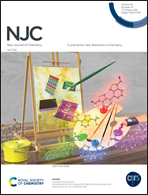Ru(ii)- and Ru(iv)-dmso complexes catalyze efficient and selective aqueous-phase nitrile hydration reactions under mild conditions†
Abstract
New water-soluble ruthenium(II)- and ruthenium(IV)-dmso complexes [RuCl2(dmso)2(NH3)(CH3CN)] (1), [RuCl2(dmso)3(CH3CN)] (2), and [RuCl2(dmso)3(NH3)]·PF6·Cl (3) have been synthesized and characterized using elemental analyses, IR, 1H and 31P NMR, and electronic absorption spectroscopy. The molecular structures of complexes 1–3 were determined crystallographically. The reactivity of complexes 1–3 has been tested for aqueous-phase nitrile hydration at 60 °C in air, and good efficiency and selectivity are shown for the corresponding amide derivatives. Best performance is achieved with complex 3. Amide conversions of 56–99% were obtained with a variety of aromatic, alkyl, and vinyl nitriles. The reaction tolerated hydroxyl, nitro, bromo, formyl, pyridyl, benzyl, alkyl, and olefinic functional groups. Amides were isolated by simple decantation from the aqueous-phase catalyst. A catalyst loading down to 0.0001 mol% was examined and turnover numbers as high as 990 000 were observed. The catalyst was stable for weeks in solution and could be reused more than seven times without significant loss in catalytic activity. The gram-scale reaction was also performed to produce the desired product in high yields.



 Please wait while we load your content...
Please wait while we load your content...
